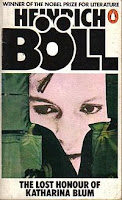Today's Sunday Guardian column.
 Pornography and plagiarism. While soft-core
versions of the former dominate best-seller lists, writers and commentators are
increasingly accused of the latter. All of this in a literary environment in
which the hard-won lessons of Modernism seem to be ignored, with
English-language writers churning out pleasantly middle-brow novels. It’s
instructive, then, to cast a look back at a novel published three decades ago
that faced charges of both plagiarism and being pornographic – yet managed to maintain
its reputation of being artistically challenging as well as satisfying.
Pornography and plagiarism. While soft-core
versions of the former dominate best-seller lists, writers and commentators are
increasingly accused of the latter. All of this in a literary environment in
which the hard-won lessons of Modernism seem to be ignored, with
English-language writers churning out pleasantly middle-brow novels. It’s
instructive, then, to cast a look back at a novel published three decades ago
that faced charges of both plagiarism and being pornographic – yet managed to maintain
its reputation of being artistically challenging as well as satisfying.
 Pornography and plagiarism. While soft-core
versions of the former dominate best-seller lists, writers and commentators are
increasingly accused of the latter. All of this in a literary environment in
which the hard-won lessons of Modernism seem to be ignored, with
English-language writers churning out pleasantly middle-brow novels. It’s
instructive, then, to cast a look back at a novel published three decades ago
that faced charges of both plagiarism and being pornographic – yet managed to maintain
its reputation of being artistically challenging as well as satisfying.
Pornography and plagiarism. While soft-core
versions of the former dominate best-seller lists, writers and commentators are
increasingly accused of the latter. All of this in a literary environment in
which the hard-won lessons of Modernism seem to be ignored, with
English-language writers churning out pleasantly middle-brow novels. It’s
instructive, then, to cast a look back at a novel published three decades ago
that faced charges of both plagiarism and being pornographic – yet managed to maintain
its reputation of being artistically challenging as well as satisfying.
When it was published in 1981, most reviews of
D.M. Thomas’ The White Hotel in the
UK were lukewarm. In the rest of Europe and in the United States, though,
reviewers were ecstatic. “Heartstunning”, “haunting”, “dazzling” – and, of
course, “lyrical” -- are just some of the adjectives on the first few pages of
my silverfish-ravaged paperback copy. The novel went on to be shortlisted for
the Booker Prize, losing narrowly to Salman Rushdie’s Midnight’s Children.
The White Hotel isn’t exactly a book to take with you to the beach. Set
mainly in the middle of the last century, it deals with the life, neurosis and
visions of Lisa, a budding young opera singer, who is treated by Sigmund Freud
for – in the language of the time – “severe sexual hysteria”. The novel’s six
parts contain erotic fantasy, poetry, letters, postcards, a case study in the
style of Freud’s ‘The Wolf Man’ and finally and most strikingly, the barbaric
reality of Nazi atrocities. Each part is connected with the other, but without
concessions: the reader has to work to make the links.
Some of the fantasies described are indeed
sexually explicit, and uncomfortably so; and the latter part of the book that depicts
the behaviour of Nazi soldiers at Babi Yar is extremely disturbing. What
catapulted the author to the front pages, however, wasn’t this as much as the
charges brought against him for appropriating sections of Anatoli Kuznetsov’s
1996 book, Babi Yar, which was termed
“a document in the form of a novel”.
Thomas tried to explain this away by pointing
to the publisher’s note at the beginning that “gratefully acknowledged” the use
of material from Kuznetsov’s book, but many weren’t convinced. In time,
however, the originality and strength of the rest of the book won out, with the
controversial sections being seen as a postmodern ploy. I’m not so sold on the
postmodernity of Thomas’ intention, but the note before the book’s text clearly
indicates that there was no intent to pass off the Babi Yar passages as his
own.
One of the things The White Hotel sets out to do is to capture the life behind the
statistic: to show how, when individuals are barbarously done away with, there
are entire real and fantasy worlds that vanish. The specific life in this case
is represented through its polar opposites of intense passion and a death wish
– that is, through Eros and Thanatos, to return to the language of the Viennese
doctor whose case study features so vividly in the novel. This is the artistic
choice that led to scenes that were dubbed pornographic, matched by later
sections that are unbearable to read. The book’s coda, a redemptive imagining
of lives after death, is an effort to mitigate some of the novel’s harsh sting,
with the message, as Lisa writes in her fantasy, that “…nothing in the white
hotel but love / Is offered at a price we can afford”.
Whether you think of it as very effective or very
overdone -- or both -- reading The White
Hotel all these decades later makes the ambitions and vision of today’s
novels seem painfully circumscribed. It’s time for more writers to take to heart
the dictum quoted by Freud in Thomas’ novel: do not turn away from “what,
unknown or neglected by man, walks in the night through the labyrinth of the
heart”.


